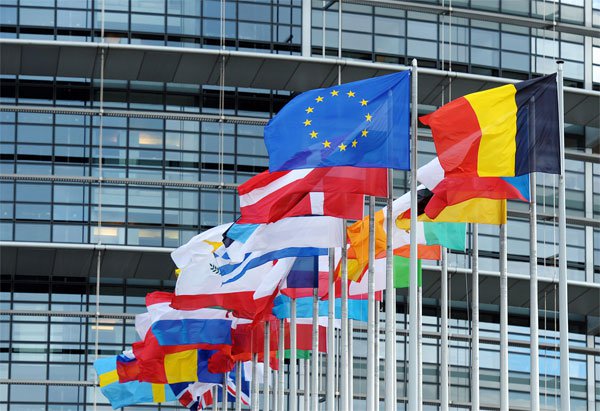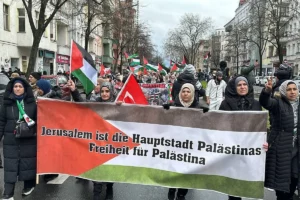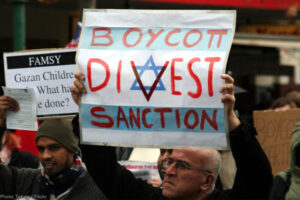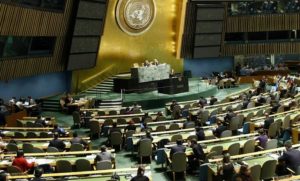 Brussel, 24 Muharram 1436 H/17 November 2014 M (MINA) – The European Union (EU) prepares a proposal for applying sanctions on Israel in case it commits actions that undermine the two-state solution with the Palestinians, an Israeli newspaper has reported.
Brussel, 24 Muharram 1436 H/17 November 2014 M (MINA) – The European Union (EU) prepares a proposal for applying sanctions on Israel in case it commits actions that undermine the two-state solution with the Palestinians, an Israeli newspaper has reported.
Quoting diplomatic sources, Israeli newspaper Haaretz said Sunday that the EU’s European External Action Services had distributed a secret document to the EU’s 28 members that contained a proposal for sanctions if Israel took actions in the occupied West Bank that could make the two-state solution impossible.
It said sanctions stipulated in the document included marking products made in Israel’s West Bank settlements when they go to EU supermarkets so that European consumers could know that these products were coming from Israel in a bid to put commercial pressures on the country, Middle East Monitor (MEMO) quoted by Mi’raj Islamic News Agency (MINA), as reporting,
Israel’s Central Bureau of Statistics referred in September to a rise in Israeli commodity exports to the European Union. It said the rise in the exports amounted to 5.5 percent from the beginning of the year to the end of August, compared with the corresponding period last year.
Also Read: Global Movement to Gaza to Hold Coordinated Rallies in 13 Cities on International Day of Solidarity
Haaretz said the sanctions stipulated in the EU secret document also included restrictions on a free-trade agreement between Israel and the European bloc.
The newspaper expected the potential sanctions to usher in concern in the Israeli society that would be coupled with deterioration in the value of the shekel, Israel’s national currency, in front of foreign currencies, especially the U.S. dollar, against the background of feeble economic growth.
Economists told Anadolu Agency earlier that weak economic growth during the second quarter of this year and slight rise in unemployment rates which has reached 6.7 percent had led to deterioration in the value of the Israeli shekel over the past months.
Israeli Finance Minister Yair Lapid warned earlier this year that even a partial European boycott would cost Israel 20 billion shekels (about $5.2 billion) in exports annually, whereas the Israeli market would lose around 10,000 jobs every year.
Also Read: Russia Warns Trump’s Gaza Plan Could Enable “Uncontrolled Experiments” on Occupied Territory
The roots of the Palestinian-Israeli conflict date back to 1917, when the British government, in the now-famous “Balfour Declaration,” called for “the establishment in Palestine of a national home for the Jewish people.”
Jewish immigration rose considerably under the British administration of Palestine, which was consolidated by a League of Nations “mandate” in 1922.
In 1948, with the end of the mandate, a new state Israel was declared inside historical Palestine.
As a result, some 700,000 Palestinians fled their homes, or were forcibly expelled, while hundreds of Palestinian villages and cities were razed to the ground by invading Jewish forces.
Also Read: Activist Unfurls Palestinian Flag During German Parliament Session, Protesting Gaza Policy
The Palestinian diaspora has since become one of the largest in the world. Palestinian refugees are currently spread across Jordan, Lebanon, Syria and other countries, while many have settled in refugee camps in the Palestinian West Bank and Gaza Strip.
On May 15 of each year, Palestinians commemorate the mass expulsion in 1948, which they refer to as the “Nakba” or “catastrophe.”
Israel went on to occupy East Jerusalem and the West Bank during the 1967 Middle East War. It later annexed the holy city in 1980, claiming it as the capital of the self-proclaimed Jewish state – a move never recognized by the international community.
Palestinians want the establishment of an independent Palestinian state in the Gaza Strip and West Bank, with East Jerusalem as its capital.
Also Read: Hundreds Rally in Stockholm to Condemn Israeli Attacks and Ceasefire Violations in Gaza
For many Palestinians, the right to return to their homes in historical Palestine as enshrined in UN General Assembly Resolution 194 remains a key demand. (T/P002/R03)
Mi’raj Islamic News Agency (MINA)
Also Read: Mass Protests Erupt in Bologna Against Israeli Teams Ahead of EuroLeague Match



































 Mina Indonesia
Mina Indonesia Mina Arabic
Mina Arabic